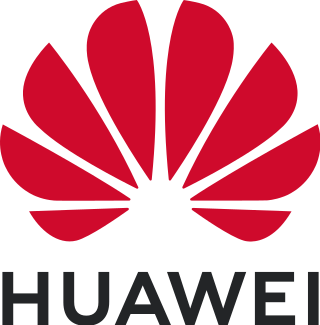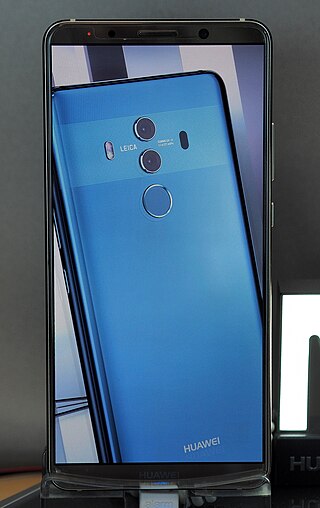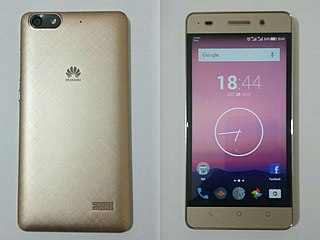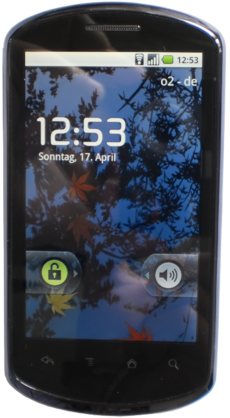
Huawei Technologies Co., Ltd. is a Chinese multinational technology corporation headquartered in Shenzhen, Guangdong, China. It designs, develops, produces and sells telecommunications equipment, consumer electronics and various smart devices.

The T-Mobile Pulse (sold as the CHT8000 in Taiwan) is an Android-powered phone manufactured by Huawei and rebranded by T-Mobile. It is available in many markets including the UK and The Netherlands. Compared to many Android phones released at the time it was relatively low cost - originally selling for £185 in the UK, the Pulse achieved a minimum price of £19.99 + £10 top up on PAYG before being discontinued in April 2011. This made it one of the cheapest Android powered smartphones available at the time. The Pulse was also marketed as being the first Pay As You Go phone running the Android OS.

The Huawei U8230 is a touchscreen mobile phone that runs on Android. The brand targets the mid-end phone market. The phone is distributed in Portugal by TMN as TMN A1.

The Huawei Sonic is a low-range smartphone manufactured by Huawei. It runs Android 2.3, has a 3.2mpx camera and access to the Internet. Radio services are also provided, unlike a Nexus, with an FM radio.
The Huawei M835 is an Android mobile phone manufactured by Huawei and sold by MetroPCS. It was also known as C8500 or C8511.

The Huawei Ascend G600 is an Android smartphone made by Huawei. It was released in 2012 during August.
The Huawei U8860 Honor is a touchscreen mobile phone running Android, and which targets the mid-high phone market.

Honor is a smartphone brand majority owned by a state-owned enterprise controlled by the municipal government of Shenzhen. It was formerly owned by Huawei Technologies. Honor provides smartphone handsets primarily targeting young consumers but has also released tablet computers and wearable technology.
Huawei Premia 4G M931 is an Android smartphone offered by MetroPCS. Huawei Premia 4G M931 features Android 4.0

The Honor 8 is a smartphone made by Huawei under their Honor sub-brand. It is a successor of the Huawei Honor 7 within the Huawei Honor series.
The Huawei Mate 9 is a high-end Android smartphone, designed and produced by Huawei as part of the Huawei Mate series. It was released on 3 November 2016. It was succeeded by the Huawei Mate 10 series, and later the Huawei Mate 20 series.
The Huawei Mate series is a line of high-end HarmonyOS-powered phablet smartphones produced by Huawei, and is one of the flagship smartphones along with the P series. Under the company's current hardware release cadence, P series phones are typically directed towards mainstream consumers as the company's flagship smartphones, refining and expanding upon technologies introduced in Mate series devices. Since 2016, Huawei has been in a co-engineering partnership with the German manufacturer Leica, whose lenses have subsequently been used on the Mate series.

The Huawei Mate 10, Huawei Mate 10 Pro and Huawei Mate 10 Lite are Android smartphones designed and marketed by Huawei as part of the Huawei Mate series. There is also a Mate 10 Porsche design, which has 256Gb of storage but is otherwise identical to the Mate 10 Pro. They were first released on 16 October 2017. Versus the predecessor Mate 9, the Mate 10 pro flagship phone has a faster processor with an integrated neural processing unit, a slightly larger OLED screen (6.0") with a taller 18:9 aspect ratio, a significantly longer battery life and a glass back construction. Chinese and international models are available in dual SIM configuration. It comes with Android 8 and a newer version of Huawei's EMUI interface. All Mate 10 models are unlocked and GSM only. Huawei phones, including the Mate series, are not sold or financed through U.S. carriers due to pressure from U.S. intelligence agencies, though they are available from independent and online retailers.

EMUI is an Android-derived mobile operating system developed by Chinese technology company Huawei. It is used on the company's smartphones and tablets.

The Huawei P series is a line of high-end and medium-range Android smartphones produced by Huawei. The P series was formerly marketed as part of Huawei's larger Ascend brand. Some models are called P smart.

Huawei Mate 20 is a line of Android phablets produced by Huawei, which collectively succeed the Mate 10 as part of the Huawei Mate series. The flagship models, the Mate 20 and Mate 20 Pro, were unveiled on 20 July 2018 at a press conference in London.

HarmonyOS (HMOS) is a distributed operating system developed by Huawei to collaborate and interconnect with multiple smart devices on the Internet of Things (IoT) ecosystem. In its current multi-kernel design, the operating system selects suitable kernels from the abstraction layer for devices with diverse resources. For IoT devices, the system is known to be based on LiteOS kernel; while for smartphones and tablets, it is based on a Linux kernel layer with AOSP compatibility libraries to support legacy APK apps, in addition to native HarmonyOS HAP apps via the Ark Compiler.

Huawei Mate 30 is a line of Android-based phablets manufactured by Huawei as part of its Huawei Mate series, and the successor to the Mate 20. The Mate 30 comprises the Mate 30/5G, Mate 30 Pro/5G, and Mate 30 RS Porsche Design, which were unveiled on 19 September 2019 in Munich, Germany.

The Honor 4C is a low-end Android smartphone produced by Honor, a sub-brand of Huawei. It was released in April 2015. It is the second low-end phone of Huawei's subrand Honor. Honor 4C has a 5.0-inch liquid crystal display and runs on Android 6 Marshmallow operating system after latest update. It is also the third phone by Honor which uses HiSilicon Kirin chipset.
The Huawei Mate X2 is an Android-based high end foldable smartphone produced by Huawei. The phone, unveiled on 22 February 2021, serves as the successor to the Mate X and Mate Xs. The phone was vastly redesigned from the previous generation, adopting a dual-screen design very similar to the Samsung Galaxy Z Fold 2.













